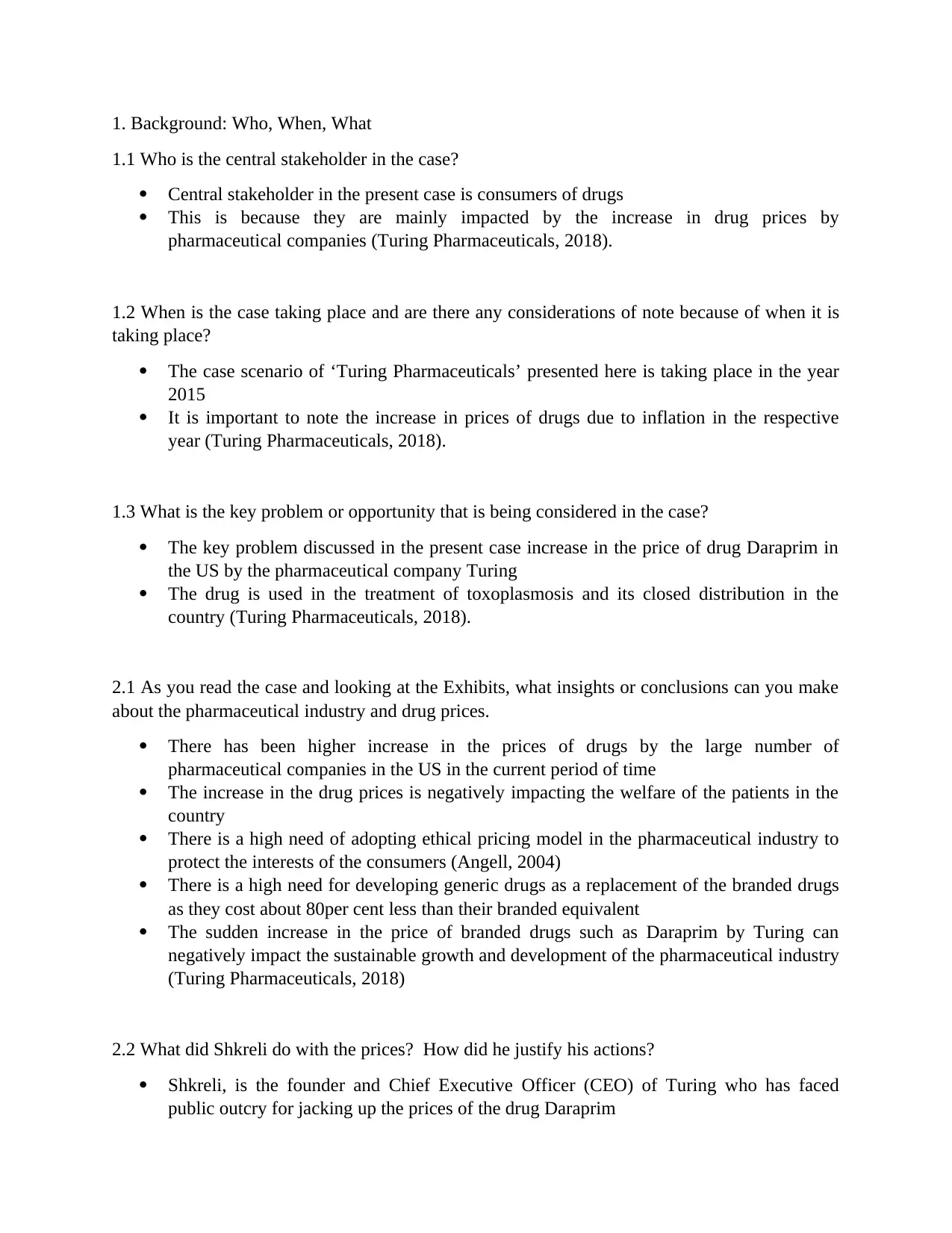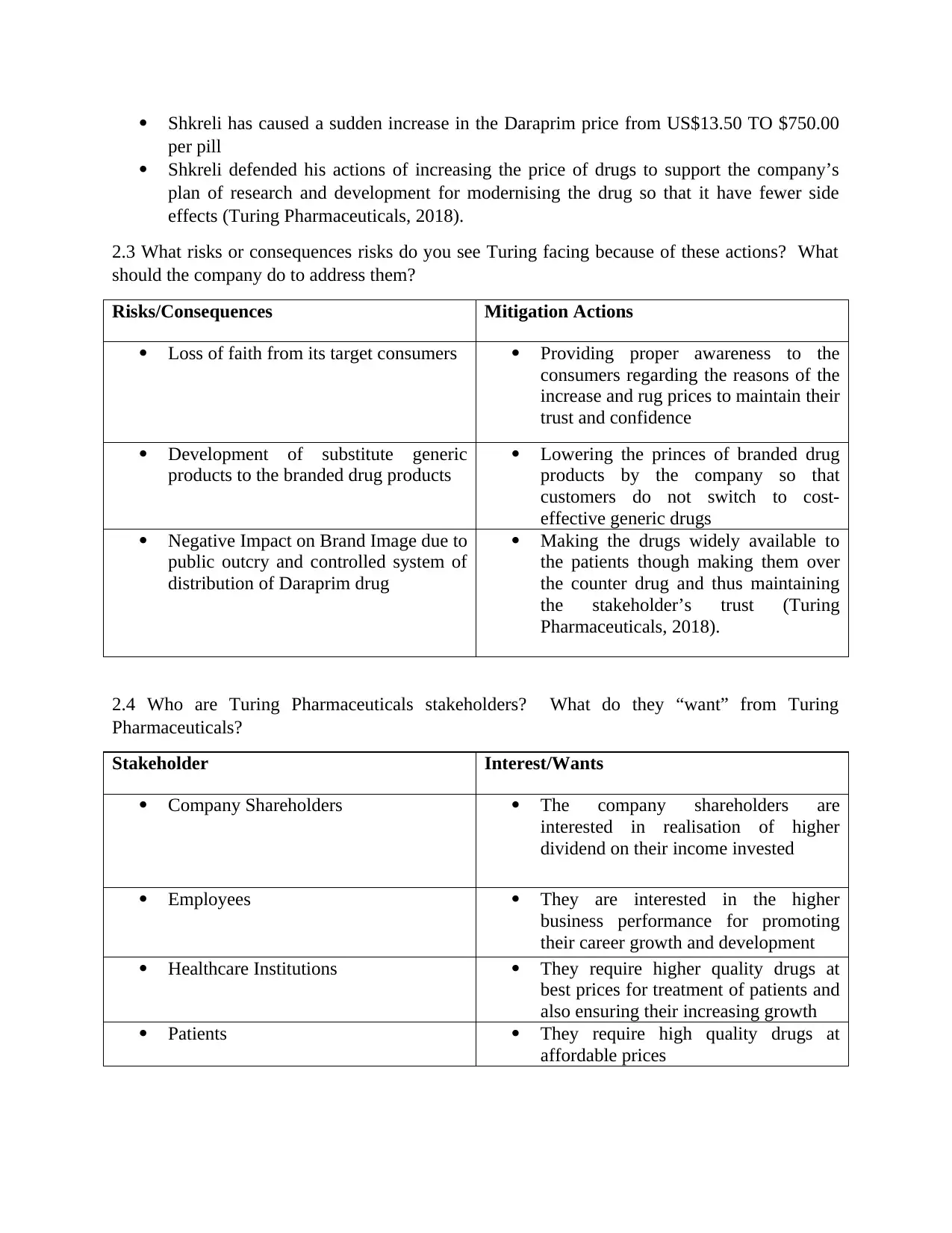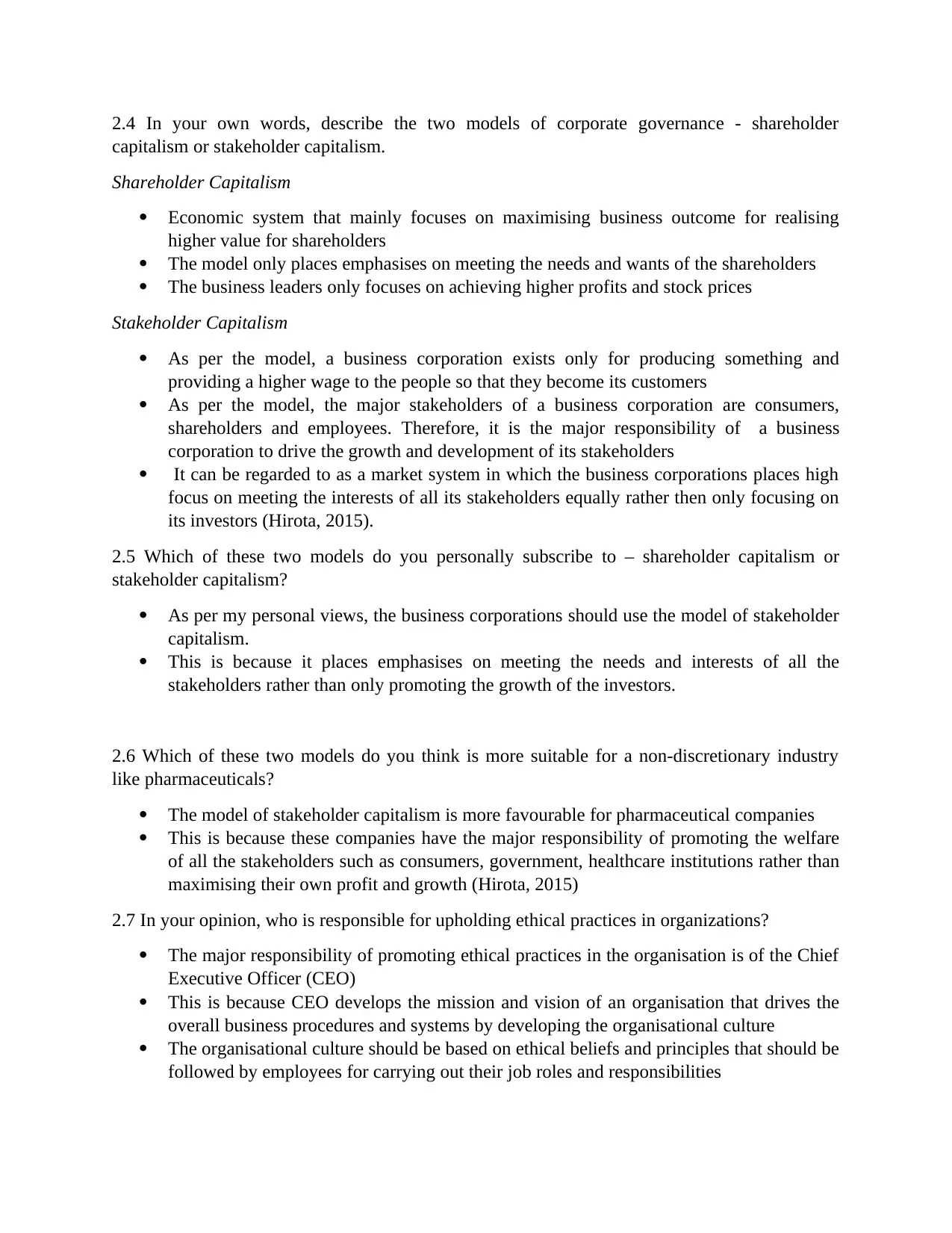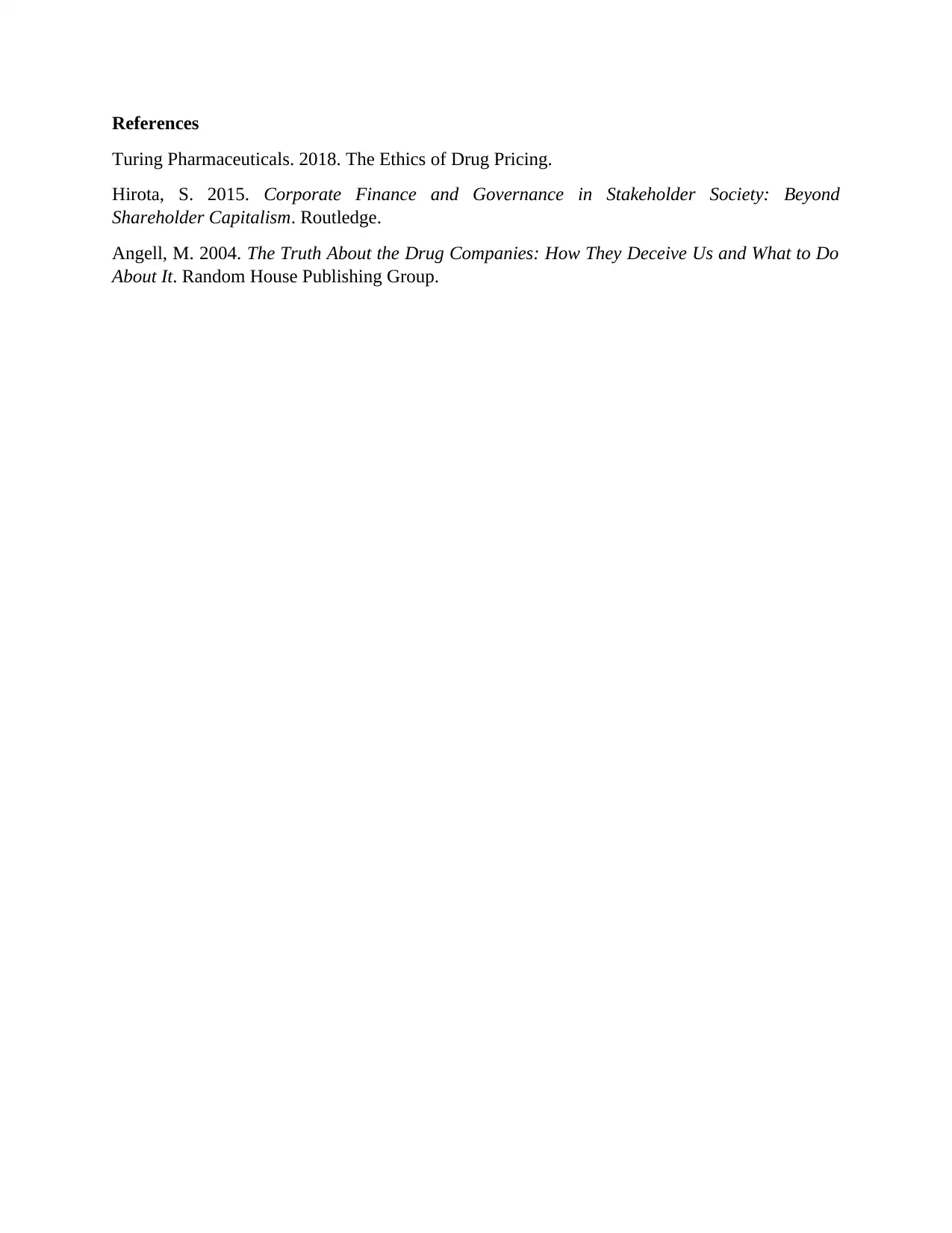Strategic Analysis of the Turing Pharmaceuticals Case Study: Ethics
VerifiedAdded on 2021/04/19
|5
|1092
|35
Case Study
AI Summary
This case study analyzes the strategic decisions of Turing Pharmaceuticals, focusing on the controversial increase in the price of Daraprim. The analysis identifies the key stakeholders, the problem of rising drug prices, and the actions taken by the company's CEO, Martin Shkreli. It explores the implications of these actions, including risks to the company's reputation and the impact on consumers. The case study examines the pharmaceutical industry and the ethical considerations surrounding drug pricing, contrasting shareholder capitalism with stakeholder capitalism. The solution provides insights into the two models of corporate governance, with a preference for stakeholder capitalism within the pharmaceutical sector, emphasizing the responsibility of upholding ethical practices within organizations, particularly by the CEO. The analysis incorporates relevant references to support its conclusions.

Strategic analysis
Paraphrase This Document
Need a fresh take? Get an instant paraphrase of this document with our AI Paraphraser

1. Background: Who, When, What
1.1 Who is the central stakeholder in the case?
Central stakeholder in the present case is consumers of drugs
This is because they are mainly impacted by the increase in drug prices by
pharmaceutical companies (Turing Pharmaceuticals, 2018).
1.2 When is the case taking place and are there any considerations of note because of when it is
taking place?
The case scenario of ‘Turing Pharmaceuticals’ presented here is taking place in the year
2015
It is important to note the increase in prices of drugs due to inflation in the respective
year (Turing Pharmaceuticals, 2018).
1.3 What is the key problem or opportunity that is being considered in the case?
The key problem discussed in the present case increase in the price of drug Daraprim in
the US by the pharmaceutical company Turing
The drug is used in the treatment of toxoplasmosis and its closed distribution in the
country (Turing Pharmaceuticals, 2018).
2.1 As you read the case and looking at the Exhibits, what insights or conclusions can you make
about the pharmaceutical industry and drug prices.
There has been higher increase in the prices of drugs by the large number of
pharmaceutical companies in the US in the current period of time
The increase in the drug prices is negatively impacting the welfare of the patients in the
country
There is a high need of adopting ethical pricing model in the pharmaceutical industry to
protect the interests of the consumers (Angell, 2004)
There is a high need for developing generic drugs as a replacement of the branded drugs
as they cost about 80per cent less than their branded equivalent
The sudden increase in the price of branded drugs such as Daraprim by Turing can
negatively impact the sustainable growth and development of the pharmaceutical industry
(Turing Pharmaceuticals, 2018)
2.2 What did Shkreli do with the prices? How did he justify his actions?
Shkreli, is the founder and Chief Executive Officer (CEO) of Turing who has faced
public outcry for jacking up the prices of the drug Daraprim
1.1 Who is the central stakeholder in the case?
Central stakeholder in the present case is consumers of drugs
This is because they are mainly impacted by the increase in drug prices by
pharmaceutical companies (Turing Pharmaceuticals, 2018).
1.2 When is the case taking place and are there any considerations of note because of when it is
taking place?
The case scenario of ‘Turing Pharmaceuticals’ presented here is taking place in the year
2015
It is important to note the increase in prices of drugs due to inflation in the respective
year (Turing Pharmaceuticals, 2018).
1.3 What is the key problem or opportunity that is being considered in the case?
The key problem discussed in the present case increase in the price of drug Daraprim in
the US by the pharmaceutical company Turing
The drug is used in the treatment of toxoplasmosis and its closed distribution in the
country (Turing Pharmaceuticals, 2018).
2.1 As you read the case and looking at the Exhibits, what insights or conclusions can you make
about the pharmaceutical industry and drug prices.
There has been higher increase in the prices of drugs by the large number of
pharmaceutical companies in the US in the current period of time
The increase in the drug prices is negatively impacting the welfare of the patients in the
country
There is a high need of adopting ethical pricing model in the pharmaceutical industry to
protect the interests of the consumers (Angell, 2004)
There is a high need for developing generic drugs as a replacement of the branded drugs
as they cost about 80per cent less than their branded equivalent
The sudden increase in the price of branded drugs such as Daraprim by Turing can
negatively impact the sustainable growth and development of the pharmaceutical industry
(Turing Pharmaceuticals, 2018)
2.2 What did Shkreli do with the prices? How did he justify his actions?
Shkreli, is the founder and Chief Executive Officer (CEO) of Turing who has faced
public outcry for jacking up the prices of the drug Daraprim

Shkreli has caused a sudden increase in the Daraprim price from US$13.50 TO $750.00
per pill
Shkreli defended his actions of increasing the price of drugs to support the company’s
plan of research and development for modernising the drug so that it have fewer side
effects (Turing Pharmaceuticals, 2018).
2.3 What risks or consequences risks do you see Turing facing because of these actions? What
should the company do to address them?
Risks/Consequences Mitigation Actions
Loss of faith from its target consumers Providing proper awareness to the
consumers regarding the reasons of the
increase and rug prices to maintain their
trust and confidence
Development of substitute generic
products to the branded drug products
Lowering the princes of branded drug
products by the company so that
customers do not switch to cost-
effective generic drugs
Negative Impact on Brand Image due to
public outcry and controlled system of
distribution of Daraprim drug
Making the drugs widely available to
the patients though making them over
the counter drug and thus maintaining
the stakeholder’s trust (Turing
Pharmaceuticals, 2018).
2.4 Who are Turing Pharmaceuticals stakeholders? What do they “want” from Turing
Pharmaceuticals?
Stakeholder Interest/Wants
Company Shareholders The company shareholders are
interested in realisation of higher
dividend on their income invested
Employees They are interested in the higher
business performance for promoting
their career growth and development
Healthcare Institutions They require higher quality drugs at
best prices for treatment of patients and
also ensuring their increasing growth
Patients They require high quality drugs at
affordable prices
per pill
Shkreli defended his actions of increasing the price of drugs to support the company’s
plan of research and development for modernising the drug so that it have fewer side
effects (Turing Pharmaceuticals, 2018).
2.3 What risks or consequences risks do you see Turing facing because of these actions? What
should the company do to address them?
Risks/Consequences Mitigation Actions
Loss of faith from its target consumers Providing proper awareness to the
consumers regarding the reasons of the
increase and rug prices to maintain their
trust and confidence
Development of substitute generic
products to the branded drug products
Lowering the princes of branded drug
products by the company so that
customers do not switch to cost-
effective generic drugs
Negative Impact on Brand Image due to
public outcry and controlled system of
distribution of Daraprim drug
Making the drugs widely available to
the patients though making them over
the counter drug and thus maintaining
the stakeholder’s trust (Turing
Pharmaceuticals, 2018).
2.4 Who are Turing Pharmaceuticals stakeholders? What do they “want” from Turing
Pharmaceuticals?
Stakeholder Interest/Wants
Company Shareholders The company shareholders are
interested in realisation of higher
dividend on their income invested
Employees They are interested in the higher
business performance for promoting
their career growth and development
Healthcare Institutions They require higher quality drugs at
best prices for treatment of patients and
also ensuring their increasing growth
Patients They require high quality drugs at
affordable prices
⊘ This is a preview!⊘
Do you want full access?
Subscribe today to unlock all pages.

Trusted by 1+ million students worldwide

2.4 In your own words, describe the two models of corporate governance - shareholder
capitalism or stakeholder capitalism.
Shareholder Capitalism
Economic system that mainly focuses on maximising business outcome for realising
higher value for shareholders
The model only places emphasises on meeting the needs and wants of the shareholders
The business leaders only focuses on achieving higher profits and stock prices
Stakeholder Capitalism
As per the model, a business corporation exists only for producing something and
providing a higher wage to the people so that they become its customers
As per the model, the major stakeholders of a business corporation are consumers,
shareholders and employees. Therefore, it is the major responsibility of a business
corporation to drive the growth and development of its stakeholders
It can be regarded to as a market system in which the business corporations places high
focus on meeting the interests of all its stakeholders equally rather then only focusing on
its investors (Hirota, 2015).
2.5 Which of these two models do you personally subscribe to – shareholder capitalism or
stakeholder capitalism?
As per my personal views, the business corporations should use the model of stakeholder
capitalism.
This is because it places emphasises on meeting the needs and interests of all the
stakeholders rather than only promoting the growth of the investors.
2.6 Which of these two models do you think is more suitable for a non-discretionary industry
like pharmaceuticals?
The model of stakeholder capitalism is more favourable for pharmaceutical companies
This is because these companies have the major responsibility of promoting the welfare
of all the stakeholders such as consumers, government, healthcare institutions rather than
maximising their own profit and growth (Hirota, 2015)
2.7 In your opinion, who is responsible for upholding ethical practices in organizations?
The major responsibility of promoting ethical practices in the organisation is of the Chief
Executive Officer (CEO)
This is because CEO develops the mission and vision of an organisation that drives the
overall business procedures and systems by developing the organisational culture
The organisational culture should be based on ethical beliefs and principles that should be
followed by employees for carrying out their job roles and responsibilities
capitalism or stakeholder capitalism.
Shareholder Capitalism
Economic system that mainly focuses on maximising business outcome for realising
higher value for shareholders
The model only places emphasises on meeting the needs and wants of the shareholders
The business leaders only focuses on achieving higher profits and stock prices
Stakeholder Capitalism
As per the model, a business corporation exists only for producing something and
providing a higher wage to the people so that they become its customers
As per the model, the major stakeholders of a business corporation are consumers,
shareholders and employees. Therefore, it is the major responsibility of a business
corporation to drive the growth and development of its stakeholders
It can be regarded to as a market system in which the business corporations places high
focus on meeting the interests of all its stakeholders equally rather then only focusing on
its investors (Hirota, 2015).
2.5 Which of these two models do you personally subscribe to – shareholder capitalism or
stakeholder capitalism?
As per my personal views, the business corporations should use the model of stakeholder
capitalism.
This is because it places emphasises on meeting the needs and interests of all the
stakeholders rather than only promoting the growth of the investors.
2.6 Which of these two models do you think is more suitable for a non-discretionary industry
like pharmaceuticals?
The model of stakeholder capitalism is more favourable for pharmaceutical companies
This is because these companies have the major responsibility of promoting the welfare
of all the stakeholders such as consumers, government, healthcare institutions rather than
maximising their own profit and growth (Hirota, 2015)
2.7 In your opinion, who is responsible for upholding ethical practices in organizations?
The major responsibility of promoting ethical practices in the organisation is of the Chief
Executive Officer (CEO)
This is because CEO develops the mission and vision of an organisation that drives the
overall business procedures and systems by developing the organisational culture
The organisational culture should be based on ethical beliefs and principles that should be
followed by employees for carrying out their job roles and responsibilities
Paraphrase This Document
Need a fresh take? Get an instant paraphrase of this document with our AI Paraphraser

References
Turing Pharmaceuticals. 2018. The Ethics of Drug Pricing.
Hirota, S. 2015. Corporate Finance and Governance in Stakeholder Society: Beyond
Shareholder Capitalism. Routledge.
Angell, M. 2004. The Truth About the Drug Companies: How They Deceive Us and What to Do
About It. Random House Publishing Group.
Turing Pharmaceuticals. 2018. The Ethics of Drug Pricing.
Hirota, S. 2015. Corporate Finance and Governance in Stakeholder Society: Beyond
Shareholder Capitalism. Routledge.
Angell, M. 2004. The Truth About the Drug Companies: How They Deceive Us and What to Do
About It. Random House Publishing Group.
1 out of 5
Related Documents
Your All-in-One AI-Powered Toolkit for Academic Success.
+13062052269
info@desklib.com
Available 24*7 on WhatsApp / Email
![[object Object]](/_next/static/media/star-bottom.7253800d.svg)
Unlock your academic potential
Copyright © 2020–2026 A2Z Services. All Rights Reserved. Developed and managed by ZUCOL.





